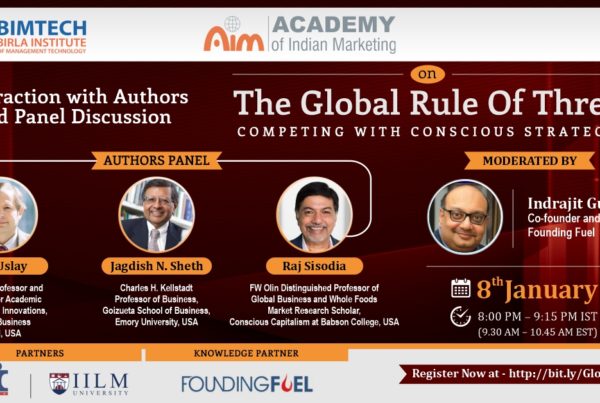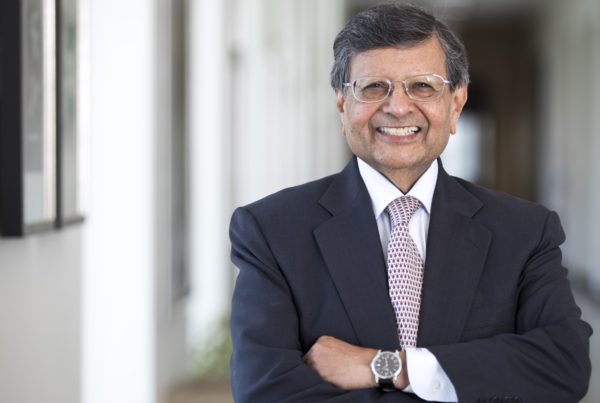Published: Jul 18, 2007 in Knowledge@Emory
A few weeks ago, Michael Dell took back his old job as CEO of Dell Inc., hoping to change the fortunes of the global computing giant he founded in 1984. Some pundits have cheered the news of Dell’s return, likening it to Steve Jobs’ successful second act at Apple, but will Dell be able to get his company’s groove back?
At Emory University’s Goizueta Business School, opinions about Dell are favorable, though some are skeptical that he will be able to turn the company around.
“I think that Michael Dell coming back was absolutely needed…the company, which used to be very entrepreneurial under Michael Dell’s leadership had become much more bureaucratic and professionalized. They had lost the spirit of the founder and the entrepreneur,” says Jagdish Sheth, a professor of marketing at Goizueta and a corporate strategist.
Another marketing scholar agrees. Although Dell has suffered recently because of the product recalls and poor perception of its customer service, Tim Halloran, an adjunct professor of marketing at Goizueta, says he believes that Michael Dell may be able to revitalize the brand by ensuring better customer service, and improving the liability of its products.
Pressure had reportedly grown in recent months for Dell to take over from his hand-picked successor, former Bain & Co. consultant Kevin Rollins. Troubled by everything from losing its status as the number one personal computer maker to Hewlett-Packard (HP) last year, to an embarrassing product recall of 4 million laptop batteries supplied by Sony Corp. (because of several well-publicized cases of spontaneous combustion), to an ongoing federal accounting probe, Dell Inc. has floundered since its 41-year-old founder stepped down as CEO in July 2004. The stock price, which stood at $35.54 when he left his post, went down to $18.95 in July 2006 and even now in the beginning of February stands only at $23.61.
The pessimism has not been confined to outside investors: in the last 12 months, eight highly ranked insiders sold Dell stock, and only one bought: a $70 million purchase by Michael Dell last May.
Sheth sees four tasks ahead for the once and future CEO. First, he says, Michael Dell needs to expand his company’s Asia markets, where most of the future growth of the PC business is expected. In this, he says, Michael Dell’s return could be extremely helpful. A well-known family owner or entrepreneur CEO is extremely important ingredient when doing business in China and India, Sheth says, where entrepreneurial owners are respected. “In those countries, the power belongs to the founder and owner,” explains Sheth. In this, he notes, Dell would be following the lead of Howard Schultz, the founder of Starbucks, who now spends all of his time on Asian expansion.
Second, he says, Michael Dell will need to push to improve the company’s laptop designs. Most laptops now are being used not just for work but for personal purposes as well, such as for e-commerce or entertainment. “The laptop is becoming more a personal device as opposed to a corporate device, very much like cell phones have become a personal device,” notes Sheth. This means, in Sheth’s view that case design and applications matter more now than formerly, when Dell was competing against makers of other off-white boxes.
Third, alternative distribution systems also will need to be developed. In the large Asian markets, in particular, he says, Dell’s buy-direct model won’t work very well. Sheth believes that Dell will have to shift its distribution strategy beyond its fabled direct sales model to a mixed model that also includes retail sales. “That will be a hard adjustment,” he observes – harder than changing its products or gaining market share in Asia.
Finally, Sheth says, Dell needs to shift its supply chain so that it can better serve its Asian markets while at the same time serving the world market, rather than gearing production entirely for the U.S. and Europe.
Can it be done? Some professors are not so sure.
Richard Metters, an associate professor of operations management at Goizueta, believes that changing the business model to meet these new challenges would be a difficult transition for Dell. “They are set up to do one thing very, very well and that is to compete on cost,” he says. If Dell wants to branch out, for instance, Metters notes, to deliver 500 colors, their supply chain is not well-suited for the change. “‘It’s not set up to provide variety—its set up to provide low cost.”
In this, Metters says, Dell could well be in the position of Ford Motor Co. as the automobile market matured. Henry Ford’s single-minded focus on cost leadership gave Ford the dominate spot in the car market until the late 1920s, when variety became important to consumers.
For a time, Ford continued to push low-cost cars available “in any color as long as it’s black,” while General Motors gained higher-margin sales from consumers who would pay more for cars available in a variety of colors and designs.
“That’s when Ford had to shut down their River Rouge plant temporarily to change production models and General Motors took command,” Metters says.
Indeed, Peter Topping, an associate professor in the practice of organization and management, agrees that cost-leadership may now be an outmoded strategy. “You’ll never win with price competition,” Topping says. “Dell has to find a way to better differentiate itself.”
Sheth, however, believes that even as Dell changes its business model and product mix, it will need to continue to try to maintain its cost leadership. Given the intensity of competition it faces against HP and Lenovo, he contends, cost will remain a factor. “Dell has to compete against them and stay the low-cost producer just to survive,” he says.
Although a man who grew a $53 billion empire from a part-time business he ran out of his college dorm room is probably not to be underestimated, is Michael Dell the right person to make that transition?
For Topping, who specializes in executive leadership, Michael Dell’s success will depend ultimately on the degree to which he can adapt to changing times. “I think it all hinges on how Michael Dell is able to evolve as a leader of that enterprise. If he can adapt his thinking and his behavior in the direction that he wants to take the company, then it’s a great move. If he can’t, then it’s not.”





